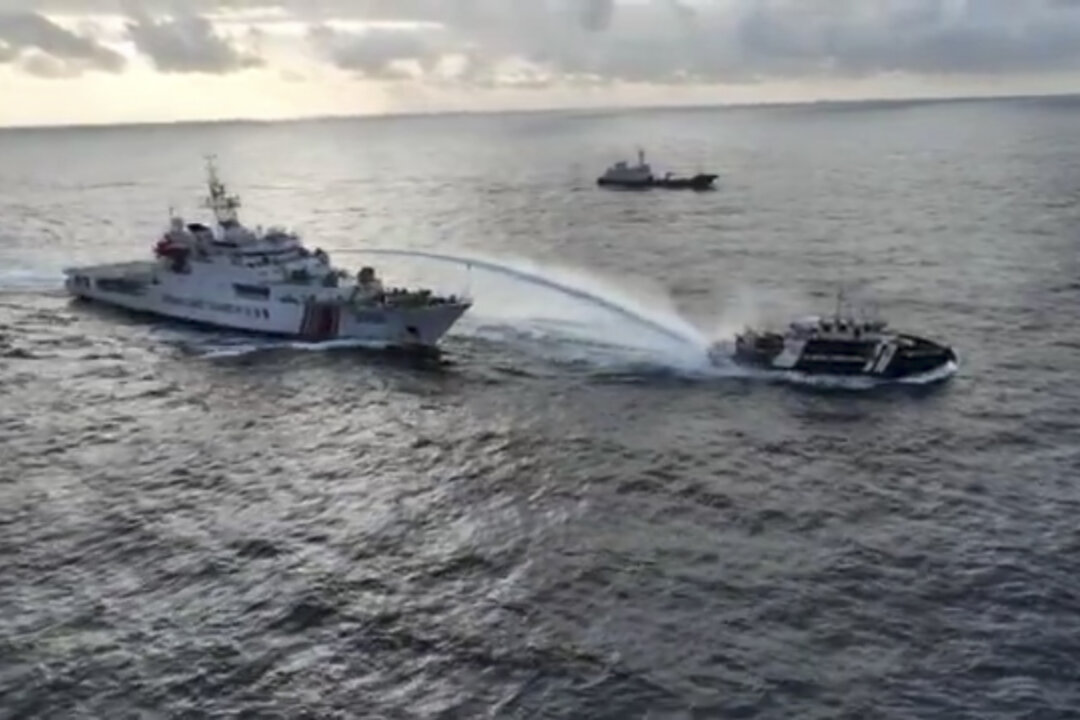Chinese vessels fired water cannons and sideswiped Philippine ships in two hotly contested areas in the South China Sea, Filipino officials said.
The United States and several allies denounced the Chinese regime’s maneuvers as dangerous on Dec. 4 after Filipino officials reported that Chinese vessels fired water cannons and sideswiped Philippine patrolling ships in two hotly contested areas of the South China Sea.
MaryKay Carlson, the U.S. ambassador to the Philippines, said that the “unlawful use of water cannons” and “dangerous maneuvers” by the Chinese Communist Party (CCP) disrupted a Philippine maritime operation and put the lives of those on board at risk.
“We condemn these actions,” Carlson said in a social media statement, reiterating the U.S. commitment to stand with like-minded friends, partners, and allies in advocating for a free and open Indo-Pacific.
One of the incidents unfolded as Philippine Coast Guard vessels and Fisheries Bureau ships were on patrol near Scarborough Shoal, a disputed reef in the South China Sea, to support their fishermen, according to Manila’s officials.
A Chinese Coast Guard ship targeted a Philippine vessel, firing a water cannon “aiming directly at the vessel’s navigational antennas,” Manila’s coast guard spokesperson Jay Tarriela said on social media platform X. The Chinese ship “intentionally sideswiped” a Philippine craft on its starboard side before releasing another round of water cannon fire, he said.
Tarriela posted footage and several photos from the Philippine Coast Guard showing what he called “blocking, shadowing, and dangerous maneuvers” by Chinese Coast Guard and Navy ships against the Philippine vessels.
The confrontation adds to the ongoing tensions over Scarborough Shoal, a triangle-shaped chain of reefs claimed by both the Chinese regime and the Philippines.
Located west of the Philippines’ main island of Luzon, Scarborough Shoal serves as a vital fishing ground for Filipino villagers and, according to international law, lies well within the Philippines’ 200-mile exclusive economic zone.
Since 2012, however, the Chinese regime has taken control of the region as part of its broad efforts to pursue claims over nearly the entire South China Sea. A 2016 ruling by an international arbitration court determined that Beijing lacked a legal basis for its historical claims in the area, but the CCP refused to recognize the ruling, ramping up its military and coast guard presence to reinforce its claims.
Following the latest confrontation, Beijing released a narrative contradicting Manila’s account.
An initial statement from China’s coast guard accused the Philippine ships of “dangerously” approaching their Chinese ships while seeking to enter what Beijing views as its territorial waters around Huangyan Island, the Chinese name for Scarborough Shoal.
A Philippine government ship “ignored multiple solemn warnings” from the Chinese side and “deliberately rammed into” their ship, Chinese Coast Guard spokesperson Liu Dejun said in a second statement, asserting that the Philippine side was a threat to the navigational safety of the Chinese fleet.
Adding to the maritime tensions, a separate confrontation on Dec. 4 saw a Philippine vessel “sideswiped” and another rammed by the Chinese coast guard ships near Sabina Shoal, another contested shoal in the South China Sea, according to Filipino officials.
Manila’s National Maritime Council vowed to not back down in the face of coercion and called on the Chinese regime to exercise self-restraint.
“The aggressive posture of the Chinese vessels highlights a continuing pattern of aggression, coercion and intimidation within Philippine waters,” the agency said in a statement.
As of publication time, the Chinese regime has not released a statement regarding the skirmish near Sabina Shoal, which it claims ownership of as Xianbin Reef.The rising tensions in the South China Sea have raised alarms not only for the United States, but also for the European Union, Australia, and China’s neighbor Japan.
The EU’s ambassador to the Philippines, Massimo Santoro, said on X that the bloc is “very concerned” by the Chinese regime’s aggressive actions against Philippine vessels, which “clearly runs counter” to the U.N. Convention on the Law of the Sea and global maritime safety regulations.
Australia stated that it was “seriously concerned” about the CCP’s aggressive behavior near Scarborough and Sabina shoals and called for “restraint and respect for international law.”
Japan echoed these sentiments, with its ambassador to the Philippines, Endo Kazuya, calling the Chinese regime’s actions “dangerous.”
“The use of water cannon & obstructive maneuvers undermine the safety of ship & crew,” he said, noting that Tokyo opposes any actions that escalate tensions.

